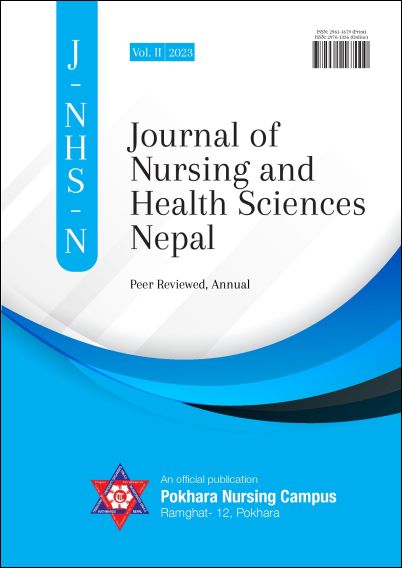Appraise State of Art to Improve the Effectiveness and Efficiency of Rehabilitation and its Outcomes among Stroke Survivors
DOI:
https://doi.org/10.3126/jnhsn.v2i1.66473Keywords:
Evidence based practice, state of arts, stroke rehabilitation, stroke survivorsAbstract
Introduction: Stroke is the common cause of death and leading cause of adult disability. Functional abilities may improve by comprehensive rehabilitation program in acute phase of stroke. Reintegrate the survivor in the community is very important. But effectiveness of rehabilitation program and intervention are limited. The aim of the study is to appraise the state of art to improve the effectiveness and efficiency of stroke rehabilitation among stroke survivor.
Methods: A descriptive literature review was conducted from online databases using key words stroke rehabilitation, stroke survivors, post stroke, physical rehabilitation. A total 25 were searched using search databases of PubMed, CHINAL, Google Scholar, ProQuest, and NepJOL by December, 2022.
Results: After extensive literature search, existing evidence based practices related to effective ness and efficient rehabilitation for stroke survivors are classified into five main types. They are 1) technology based post-stroke rehabilitation, 2) physical exercise based rehabilitation, 3) cognitive rehabilitation, 4) educational rehabilitation, and 5) complementary and alternative therapies specially yoga.
Conclusions: Technology based therapies are the first choice for physical rehabilitation among stroke patients. But those therapies are more not feasible everywhere because of more expensive and need special equipment and well managed setting for practice. In contrast, yoga has been used extensively with given more priorities in physical as well as holistic health outcomes. Yoga is more cost effective, safe, can practice in any setting.
Downloads
Downloads
Published
How to Cite
Issue
Section
License
Copyright (c) 2023 The Author(s)

This work is licensed under a Creative Commons Attribution 4.0 International License.
This license enables reusers to distribute, remix, adapt, and build upon the material in any medium or format, so long as attribution is given to the creator. The license allows for commercial use.




